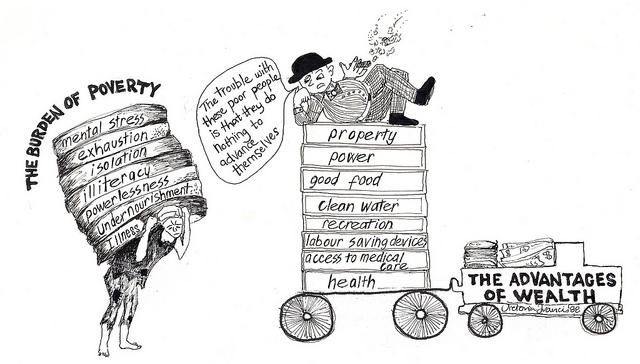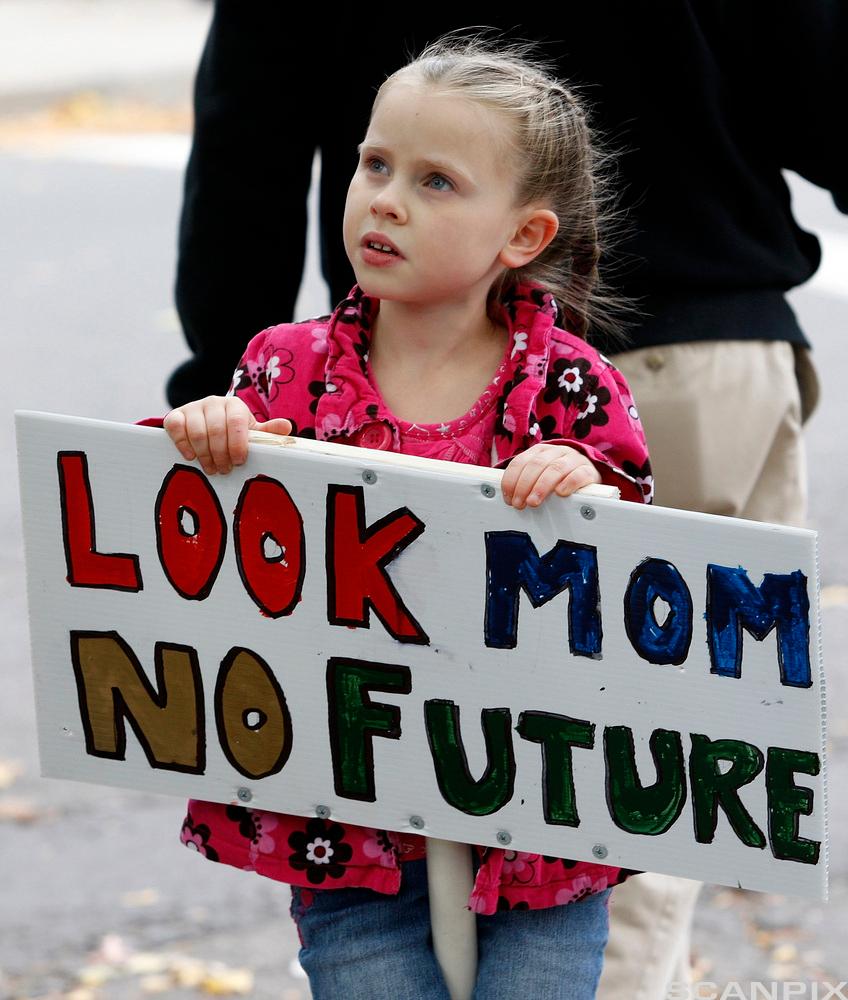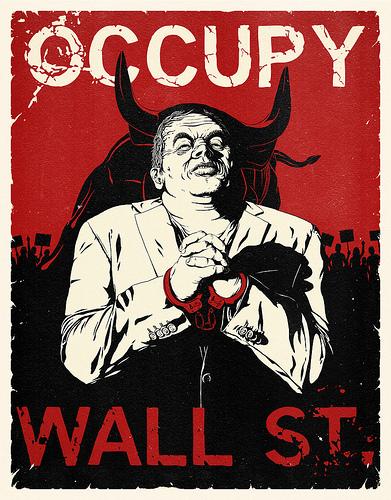
Vocabulary
These words and expressions appear in the text. Check that you know them all:
in the wake of, foreclosures, retiremnent, walk of life, assets, snappy, objection, evoke, detention, vague, facility, to urge

The economic crisis has brought down the governments in Italy and Greece, and ordinary people have reacted. Their everyday situation with increasing unemployment, foreclosures, raised retirement age, and a poorer public service in general has made them speak out against their government and the uneven distribution of wealth.
Occupy Wall Street

The movement, Occupy Wall Street, started in September 2011 as a spontaneous initiative by activists who literally occupied Wall Street, the financial core of America. The protesters gathered in the parks on lower Manhattan to send a message to the authorities about what they saw as an unfair system. The idea caught on and soon spread to many major cities in the USA and also to Europe. There was a revolutionary spirit in the air; people from all walks of life united in this protest against the system that had turned the common man into a loser. The movement got massive media attention and was supported by both celebrities and trade unions who want a more extensive regulation of banks and financial institutions. They also called themselves The 99 Percent Movement indicating the unbalanced distribution of wealth in the USA, where one per cent of the population owns more than 40% of the country’s total assets. The media tried to label the phenomenon as a left-wing response to The Tea Party Movement, but commentators claim that the movement will never represent any political influence because it is too badly organised and too spontaneous. They seem to have no unifying leadership and to outsiders they may look more like the hippie movement reborn, with singing, pamphlets, balloons and snappy slogans. Still, the movement represents a signal from the people, and should as such be paid attention to by those in power. The spread of wealth in America is a direct result of the country’s liberal economic politics, so the work has to start in that arena rather than in the parks on lower Manhattan.
The Authorities Strike Back

The activists of the Occupy Wall Street movement were met brutally by the police, who used pepper spray, water cannons and mass arrests to control the protesters. Most people were shocked by the brutality, and even within the police force there were objections: “This is not why I joined the force” was the statement from an Afro-American US marine in Oakland. “If the cops want to fight they should go to Iraq or Afghanistan”. The police action was coordinated in all the biggest cities; it was obvious that the authorities wanted to stop this movement effectively before it turned into a revolution. Some senators even compared it to terrorism, a word that evokes strong associations in the American people, but it seemed a bit far-fetched to call these people terrorists. However, the Senators were serious. In December 2011, the Senate passed the National Defense Authorization Act, which opens for the detention of anyone, American citizen or not, who is defined by the government as a possible terrorist. The vague definition would in fact include many of the activists behind the Occupy Wall Street movement and similar protest organisations. The enforcement of the law is left in the hands of the military, which again opens for indefinite detention without trial on the grounds of suspected terrorism. This is the crucial issue – to give the military the power to investigate and interrogate, which is the same as granting it political power. The detention camps are already there, currently established for the deportation of migrant workers, but the facilities are easily turned into so-called “emergency environments”. As early as in 2006, the Homeland Security (the domestic security department in the USA) arranged for the establishment of multi-use facilities for the Immigration and Customs Enforcement, as part of the US-Mexican border control.
Many Americans see the new National Defence Authorization Act as a threat to civil liberties in The USA. The American establishment, particularly the Republican wing, looks very anxiously on movements like Occupy Wall Street and is ready to take harsh action to abort them, even if it means defining them as terrorists. The American writer, Mark Twain, once said: “To a man with a hammer, everything looks like a nail.”
The liberal opposition now urges President Obama to veto the new act. However, after some revision of the act the White House has announced that the President’s advisors do not recommend a veto.
Tasks and Activities
Vocabulary
Public Protest, Vocabulary - Drag and Drop
Comprehension and Discussion
- Do you think it is only fair that people have to share the cost when their leadership has brought their country into debt?
- Would you have joined a movement like Occupy Wall Street ? Why / why not?
- In what way does The National Defence Authorization Act imply a threat to constitutional American rights?
- Explain the Mark Twain quote at the end of the article.
- Do you think the article and the links listed as sources give an unbiased presentation of the issue? If not, search the net for further information that presents the issue from different angles. For example, how is the new act officially presented by the White House?
Suggested Reading
Social Media and Political Change